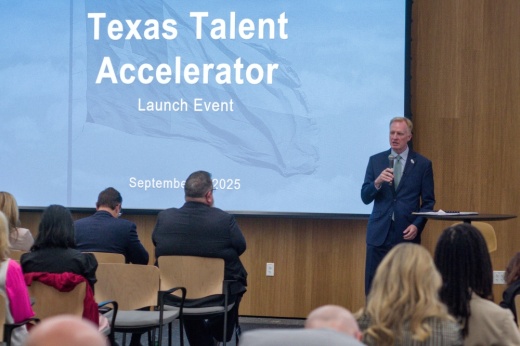In a nutshell
The accelerator aims to optimize education and job training to meet labor demands in the growing North Texas economy, Keller said.
“We have rising sectors in financial services, supply chain and logistics, health care, film and entertainment,” Keller said. “We have the most top-tier higher education institutions of any of the metro areas. ... We have all the pieces of the puzzle, but we need to connect them more strategically.”
Keller said the current labor market data is abstract and too slow to integrate into curriculum design, and the talent accelerator aims to streamline communication between employers and educational institutions.
Diving deeper
Accelerator Executive Director Ben Magill said the program is seeking “data-driven input,” from colleges and universities to understand how many students are graduating from each institution, and with what certifications, to understand the labor supply.
The initiative partnered with several North Texas education providers, including Collin College, Dallas College, North Central Texas College, Texas State Technical College, Texas Woman’s University and the UNT system, according to the accelerator’s website.
Magill said the program will also work with local employers to understand what training and education employers need from new hires and college graduates, in an effort to sync education and training with market demands. Colleges and universities could choose to create new certifications or curricula based on data from the accelerator, Magill said.
“What are the specific skills that we need? Who can provide those skills?” said Anna Crockett, a panelist and senior adviser at the Federal Reserve Bank of Dallas, during the panel. “Which employers need this versus that? Getting really really specific and answering those questions will help us stay on track."
Also of note
Crockett cited an August report from the Federal Reserve Bank of Dallas that said roughly two-thirds of native Texans do not have an education beyond a high school diploma.
“Right now in Texas, only a third of adults have something more than a high school degree,” Crockett said during the panel.
“In five years time, in 2030, 60% of jobs in Texas are going to require something more than a high school education,” Crockett said, referencing data from Georgetown University.
What’s next?
Magill said the next step is to acquire and analyze enrollment, demographic and graduation data from the accelerator’s education partners to paint a picture of the labor supply.
“We're not going to change the workforce in two years time. That's just impossible. So it's going to take a long time, but it's going to be worth it,” Crockett said.





